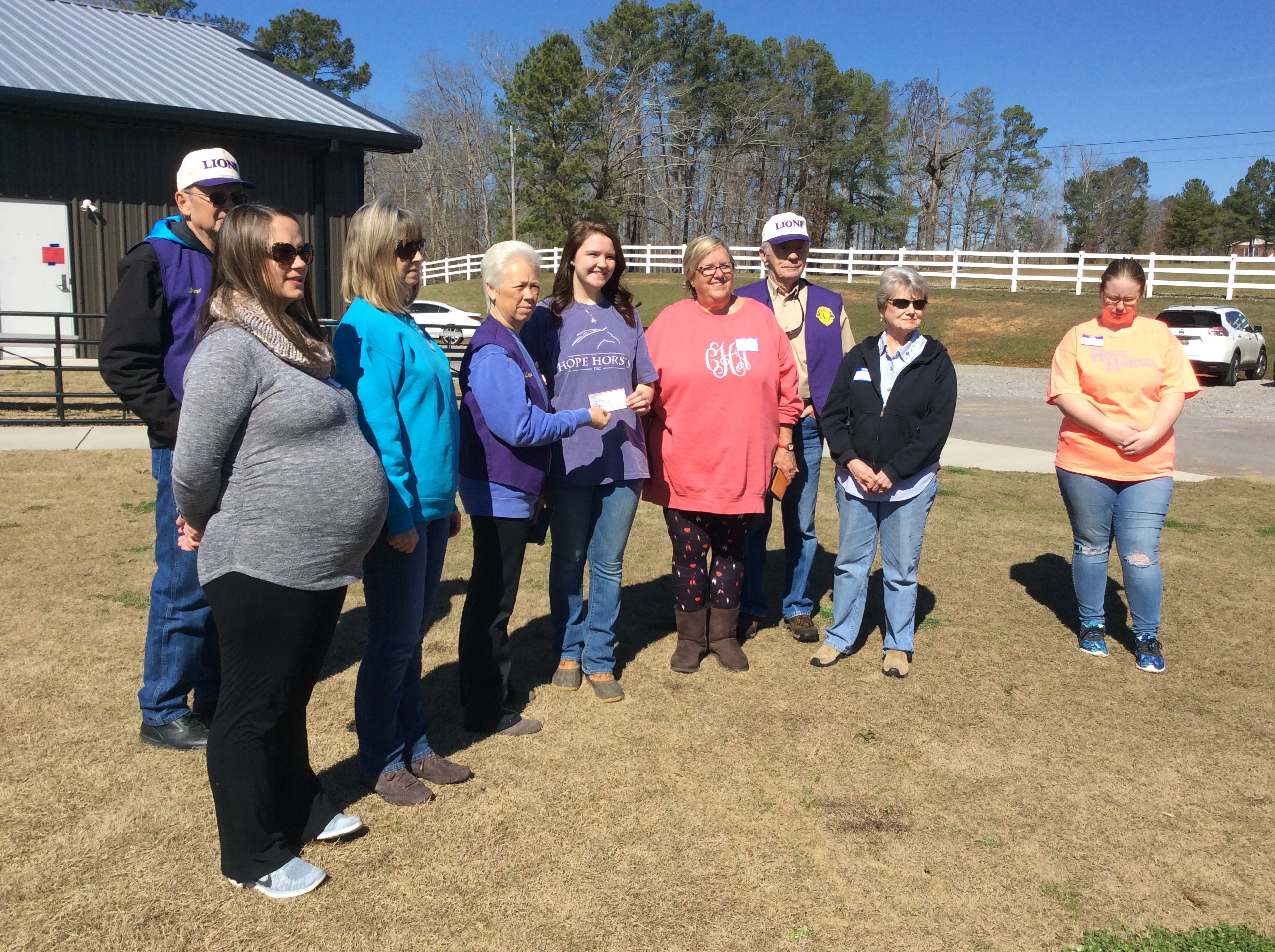Hope Horses, Inc. receives a donation from the Cullman Community Lions Club
CULLMAN – For the past few years, Camp Seale Harris has partnered with the Cullman Community Lions Club to put on a Family Fun Day for children with diabetes and their families. The event, along with most other events the camp puts on, aims to provide children and parents with a fun day together as well as education on diabetes and resources the families can turn to. This year’s event was held at Hope Horses, Inc., a nonprofit that provides therapeutic riding opportunities to children and adults with special needs.
After registration was finished, John Latimer (programs director for CSH) thanked the Cullman Community Lions Club and Hope Horses for their help in organizing the day's events, and the Lions gave a donation to the Hope ranch as thanks for being able to use their facilities.
Executive Director for Hope Horses, Kelsey Rice, gave a short introductory speech about the organization and what its basic purpose is, then said that they are always looking for volunteers to help out. She then turned the spotlight back to Latimer, who informed the parents that the camp has provided instruments and meters to help monitor blood sugar levels if anyone was in need of them. The children were then divided into four groups and taken down to the sensory trail with their group leaders while other volunteers helped set up games.
The children competed in three games: a water relay to see who could fill their bucket the fastest, a horse race where kids had to ride their "horses" a certain distance and back and a hula hoop game where all members of the group had to get through the hoop without letting go of each other's hands. Group 1 ended up being the victors for all three games. After the activities, Latimer let the kids catch their breath with an educational lecture.
His first point was talking about the different resources available to people with diabetes other than just the hospital. He talked about community apps like "Beyond Type 1," which allow people to ask questions and receive advice from other people with diabetes. He also highly recommended the app "Glu," which compiles information from surveys and hospital records into a database that presents specific statistics on diabetes across the nation. The company also has its own institutional review board to go over all the information received.
Latimer then brought in audience participation for his next point, asking the parents what they would want if they could have anything to help their kids. Among the wishes were medical resources closer to home (most families said they have to travel to Children's of Alabama or Vanderbilt), more information about the availability of diabetic service dogs, and one parent brought up a desire for an insulin pump known as an "artificial pancreas," which gives off small amounts of insulin and glucagon based on the readings of a sensor. Latimer said that a friend of his who participated in trials for that pump ended up between 65 and 160 over a three-day period, but a drawback of the pump was that the glucagon goes bad about 24 hours after the solution is mixed.
The last thing Latimer talked about before lunch was Camp Seale Harris and everything it does. Along with the Family Fun Days, it also holds overnight family weekends, day camps and overnight summer camps. The overnight weekend provides parents with diabetes education and the opportunity for a bit of alone time while their children are safe and supervised (He empathized that most parents of diabetic children feel like they are on guard 24/7 to help their kids). The day camps in summer take place in Huntsville and Birmingham, and parents drop their children off in the morning and pick them up at night for a week. The camp checks blood sugar levels routinely and provides parents with a list of the levels and their child's diet at the end of the week. The overnight camp works the same way, except children are put into cabins with others their age and have their blood sugar levels checked twice during the night and up to eight times during the day.
Lunch was provided for the participants, and the number of carbs in each sandwich and bag of chips was given to help parents know how much their children were taking in. After lunch, the children were given the opportunity to groom and ride the horses, which many of them had been looking forward to all day.
For more information about Camp Seale Harris, their programs and financial aid for the summer camps, visit http://www.campsealeharris.org/.
More information about Hope Horses, Inc. can be found at http://www.hopehorses.org/.
Copyright 2017 Humble Roots, LLC. All Rights Reserved.




















